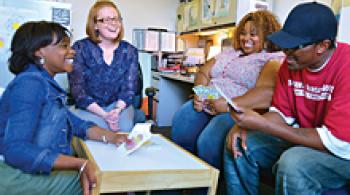By Kristina Rolfes
Q&A with Joan Kaufman, PhD, new Director of Research at the Center for Child and Family Traumatic Stress
Your work focuses on children who have experienced trauma, such as abuse or neglect. How does your research aim to understand and help these children?
The goal of our research is to better understand risk and resiliency in traumatized children, and to utilize what we learn to develop more effective interventions and social policies. One area we’re looking at is how genetic and environmental factors interact in maltreated children. People used to think of genes as fixed and static, but what’s emerged in recent years is how dynamic the interplay is between genes and the environment. Different experiences can alter gene expression. These epigenetic changes—chemical modifications, not a change in DNA sequence—are relevant in predicting which children go on to develop problems like depression. What’s exciting is that positive things in the environment, such as stable social supports, can reduce the risks associated with a history of traumatic stress and genetic vulnerability.
What are the effects of early childhood traumatic experiences?
Adverse childhood events increase the risk for psychiatric and substance abuse diagnoses, and is associated with changes in the brain systems implicated in these disorders. It can also increase risk for physical health problems, such as obesity, cardiovascular disease, diabetes, and even cancer.
Are the problems that result from trauma preventable or treatable?
Absolutely, but we are only in the early stages of understanding how genes and environment influence risk for psychiatric and medical health problems following early adversity. However, it is a time for optimism as emerging data suggests that medications, psychotherapy, and alternative treatments like yoga can ameliorate the negative brain changes associated with childhood trauma.
How does community violence impact children?
When children witness community violence, they have an increased risk for post-traumatic stress disorder and other mental health problems. In the aftermath of the unrest in Baltimore, we are committed to working more broadly with the community to meet the needs of those who don’t traditionally come through our doors, and are seeking resources to expand these efforts.
What brought you to Kennedy Krieger?
It’s really the clinical infrastructure that makes me so excited about being here. Our center provides the best available evidence-based trauma treatments, but there are no treatments in psychiatry that work for all patients. We are excited about the prospect of bringing tools from neurobiology to social policy to learn how to better help all children reach their potential—no matter what they’ve been through.


